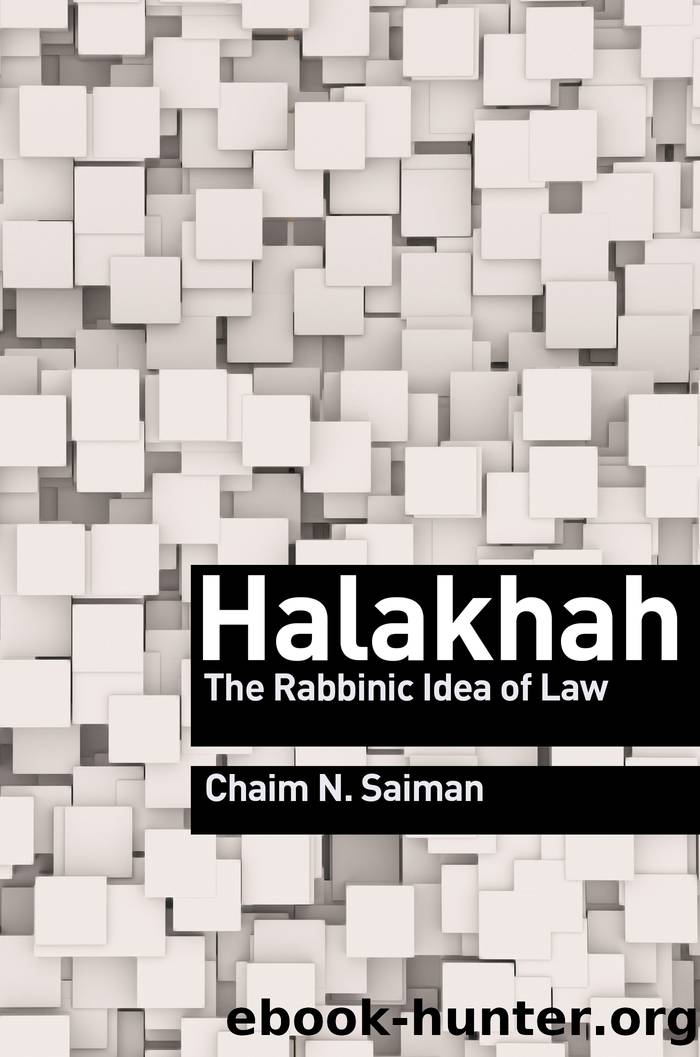Halakhah by Saiman Chaim N

Author:Saiman, Chaim N.
Language: eng
Format: epub
Publisher: Princeton University Press
Published: 2018-03-15T00:00:00+00:00
10
The Idea of Halakhah in the Codes
Those who are drawn to issuing practical guidance according to the Shulḥan Arukh rule in matters of Torah in ways that do not accord with the correct halakhah, as they do not know the source from where the ruling is derived, and they make up reasons of their own accord and thus multiply disputes within Israel.
âJOEL SIRKES (1561â1640)1
There is no doubt that [the Shulḥan Arukh and the work of R. Moses Isserles] were written by Godâs hand â¦. The spirit of God flowed through the authors so that their words would be directed toward the correct halakhah even without the authorâs intent, and the will of God was accomplished through their hand.
JONATHAN EIBESCHITZ (1690â1764)2
MORE THAN ANY OTHER WORKS of halakhah, the treatises that have come to be known as âthe Codesâ (see below) offer the starkest contrast to the idea of halakhah-as-Torah traced in previous chapters. For while the Talmud, Tosafot, and even Maimonidesâ code engage halakhah on a variety of levels, the Codesâ express interest is to frame halakhah as black-letter directives that govern Jewish life of the exilic present.
The gulf between the Talmud and the Codes can be seen by contrasting almost any talmudic sugya with the corresponding provision in the Codes. In chapter 5, we discussed the mishnaic debate over whether a sword may be carried on Shabbat. In the Talmud, this seemingly minor regulation birthed a discussion over the image of manhood and the nature of the messianic era. The Codes, however, present this as a flat legal rule with nary a trace of the philosophical, theological, or metaphoric ideas developed in the Talmud.
Anyone who goes out with an object that is not an adornment and is not something usually worn, but carries it in its normal fashion, is liable.⦠Therefore, a man should not go out with a sword, or a bow, or a shield ⦠and if he did, he is liable for a sin offering. (Shulḥan Arukh OḤ §301:7).
Given the style and function of the Codes, conventional wisdom holds that they state only halakhah le-maâasehâthe binding law that applies in the present eraâand no more. Using more formal terms employed by legal scholars, the Codes establish halakhahâs ârule of recognition,â that is, the test for determing which rules are legally binding. In traditional Jewish practice, the halakhah stated in the Codes is law in the most direct and immediate sense of the term.
But is this description wholly accurate? This chapter will argue that the conception of halakhah developed in the Talmud is so deeply rooted in the structure of rabbinic thought that even works expressly devoted to a functional account of halakhah never fully realize their goal. Using three examples, weâll see that while the Codes succeed in establishing authoritative rules of practice that replace the Talmudâs text, they are less successful in supplanting the talmudic method. Instead, even the most functional works of black-letter halakhah tend to replicateârather than to resolveâthe complexity embedded in the rabbinic understanding of halakhah.
Download
This site does not store any files on its server. We only index and link to content provided by other sites. Please contact the content providers to delete copyright contents if any and email us, we'll remove relevant links or contents immediately.
The Power of Habit by Charles Duhigg(3117)
Man's Search for Meaning by Viktor E. Frankl(2661)
Mckeown, Greg - Essentialism: The Disciplined Pursuit of Less by Mckeown Greg(2413)
MOSES THE EGYPTIAN by Jan Assmann(2407)
Devil, The by Almond Philip C(2322)
The Complete Dead Sea Scrolls in English (7th Edition) (Penguin Classics) by Geza Vermes(2269)
Unbound by Arlene Stein(2265)
I Capture the Castle by Dodie Smith(2027)
Schindler's Ark by Thomas Keneally(1869)
The Invisible Wall by Harry Bernstein(1795)
The Gnostic Gospel of St. Thomas by Tau Malachi(1779)
The Bible Doesn't Say That by Dr. Joel M. Hoffman(1674)
The Secret Doctrine of the Kabbalah by Leonora Leet(1600)
Political Theology by Carl Schmitt(1568)
The Jewish State by Theodor Herzl(1526)
A History of the Jews by Max I. Dimont(1517)
The Dead Sea Scrolls Bible by Martin G. Abegg(1500)
The Book of Separation by Tova Mirvis(1479)
Oy!: The Ultimate Book of Jewish Jokes by David Minkoff(1360)
